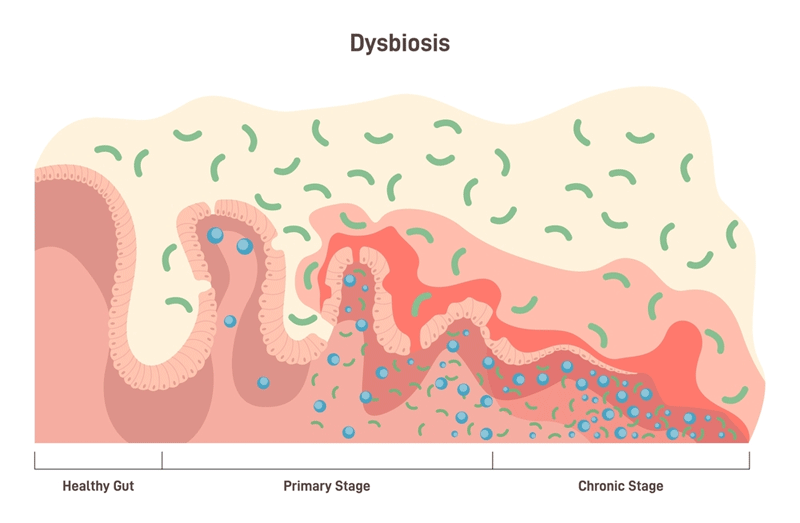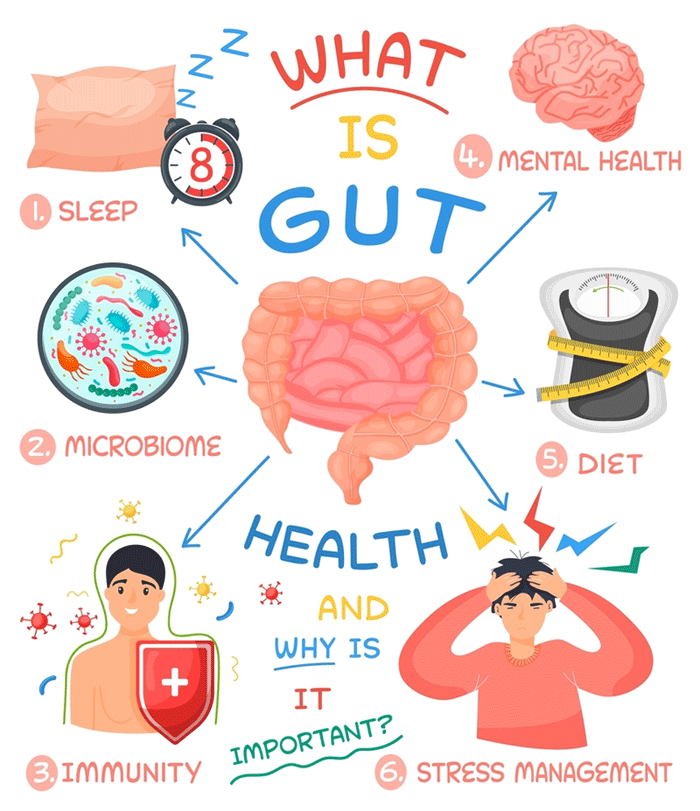ADHD is a well-known neurodevelopmental disorder that affects millions of people, especially children and adolescents. Approximately 6 million children in the US, which means 10% of the total population aged between 3-17 years, are diagnosed with attention-deficit/hyperactivity disorder (ADHD).
Various factors, including the balance of bacteria in the gut microbiome, may influence this disorder’s severity and onset of symptoms. In this article, I’ll explore the connection between ADHD and gut health, examining the latest findings.
Understanding Gut Health
Before I delve into the connection between ADHD and gut health, it’s essential to understand what gut health entails. The gut microbiota comprises trillions of microorganisms such as bacteria, fungi, and viruses and is a highly intricate ecosystem often referred to as the “second brain” of the human body. This microbiota plays a crucial role in various aspects of our health, including digestive health, immunity, and mental well-being.
The Gut-Brain Axis
To understand the connection between ADHD and gut health, it’s important to comprehend the gut-brain axis. This bidirectional communication system connects the gastrointestinal tract (the gut) and the central nervous system (the brain). Recent studies have shown that imbalances in the gut microbiome can affect brain health, behavior, and even mood.
Understanding Gut Microbiome Imbalance
The gut microbiome comprises trillions of bacteria, viruses, fungi, and other microorganisms that coexist harmoniously in a healthy individual. Disruption of balance can lead to dysbiosis, where harmful microbes outnumber beneficial ones. Factors such as a poor diet, excessive antibiotic use, chronic stress, and genetics can all contribute to gut microbiome imbalances.
Gut Microbiome and ADHD
Emerging research has indicated that alterations in the gut microbiome composition may be associated with ADHD. Here are some key findings:
-
Microbial Diversity
Research has shown that people with ADHD often have different gut microbiome composition than those without the condition. Reduced microbial diversity and alterations in specific bacterial strains have been observed.
-
Inflammation
Chronic inflammation in the gut can lead to a leaky gut, allowing harmful substances to enter the bloodstream. This inflammation may also trigger inflammation in the brain, potentially exacerbating ADHD symptoms.
-
Neurotransmitter Production
The gut microbiome is crucial in producing neurotransmitters like serotonin and dopamine, essential for regulating mood and behaviour. An imbalance in these neurotransmitters can contribute to ADHD symptoms.
-
Immune System Activation
The gut is home to a significant portion of our immune system. Dysregulation of the immune system response in the gut can lead to systemic inflammation, which may affect brain function and contribute to ADHD symptoms.
Diet and Gut Health
A growing body of evidence suggests that dietary choices can significantly impact gut health and, consequently, ADHD symptoms. Some nutritional factors to consider include:
- Sugar and Artificial Additives: Diets high in sugar and artificial additives have been associated with increased ADHD symptoms. These substances can disrupt the gut microbiome and exacerbate inflammation.
- Omega-3 Fatty Acids: Omega-3 fatty acids in fatty fish, flaxseeds, and walnuts have anti-inflammatory properties and may help alleviate ADHD symptoms by supporting gut health.
- Probiotics and Prebiotics: Consuming probiotic-rich foods (e.g., yogurt, kefir) and prebiotic foods (e.g., garlic, onions, and asparagus) can promote a healthy gut microbiome.
Potential Causes of ADHD
Extensive research has established a strong link between the gut microbiome, mycobiome, and ADHD. However, it is important to note that other factors also play a significant role in the development and severity of ADHD symptoms.
ADHD and other mental health challenges can have multiple causes, according to Bostan. These causes can vary greatly and can influence the development of the condition.
Wald identified:
- Genetics
- Anatomy (specifically, the volume of different brain structures) Physiology (the action of chemical messengers in the brain)
As the three most common determinants of ADHD, although there is no single difference that can be pointed out in people with ADHD, Wald’s research provides strong evidence for the role of these determinants in the development of the disorder.
Practical Steps for Better Gut Health
While more research is needed to understand the relationship between ADHD and gut health fully, individuals and parents of children with ADHD can take proactive steps to promote a healthy gut:
- Adopt a Balanced Diet: Focus on whole, unprocessed foods rich in fibre, fruits, vegetables, and lean proteins. Minimise sugary and processed foods.
- Consider Probiotics: Discuss with a healthcare professional the benefits of probiotics and the possibility of incorporating probiotic supplements into your or your child’s diet.
- Manage Stress: Chronic stress can hurt the gut microbiome. Incorporate stress relief management techniques like mindfulness, meditation, or yoga into your daily routine.
- Limit Antibiotic Use: Use antibiotics judiciously, as they can disrupt the gut microbiome. Follow your healthcare provider’s recommendations for antibiotic use.
Conclusion
The evidence suggests a notable relationship between the two. Understanding the gut-brain axis and its impact on ADHD provides a new perspective on the condition’s management and potential avenues for treatment. Further studies are needed to uncover the full extent of this link, but for individuals with ADHD, paying attention to gut health through diet and lifestyle changes may offer additional support in managing their symptoms.
Frequently Asked Questions
Can addressing gut health alone treat ADHD?
Addressing gut health is not a standalone treatment for ADHD. ADHD is a complex neurodevelopmental disorder, and its management typically involves a combination of approaches, including behavioral therapy, medication (when prescribed by a healthcare provider), and lifestyle modifications. Improving gut health may complement these treatments but is unlikely to be the sole solution.
Can gut health affect mental health in general?
The impact of gut health on mental health is now widely recognized. The gut-brain axis, which refers to the connection between the gut and the brain, has been found to have a significant influence on mood, cognition, and behavior. Studies have shown that imbalances in the gut microbiome can lead to various mental health conditions, including anxiety and depression.
What dietary changes can I make to support gut health for someone with ADHD?
A diet that promotes gut health typically includes fiber-rich foods like fruits, vegetables, whole grains, and legumes. Probiotic-rich foods like yogurt, kefir, and fermented foods can promote a healthy gut microbiome. Reducing processed foods, sugar, and artificial additives may be beneficial.



